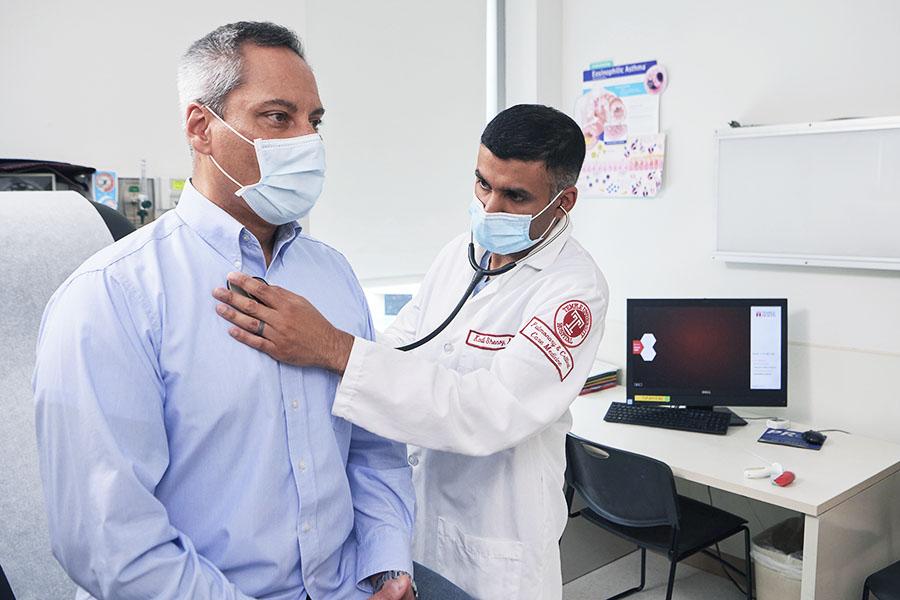What Is Ulcerative Colitis?
Ulcerative colitis is an inflammatory bowel disease (IBD) that causes inflammation and ulcers in the large intestine. It is a chronic disease, but its symptoms may come and go – flaring up for a few days, weeks or months before going into “remission,” or a period of no symptoms.
The cause of ulcerative colitis is unknown. It affects more than half a million Americans, many whom are between ages 15-30 when they are diagnosed. Individuals with a family history of ulcerative colitis or another IBD are more likely to develop the condition.
There are five types of ulcerative colitis, which are distinguished by the location and severity:
-
Ulcerative proctitis – A mild form of ulcerative colitis, inflammation only affects the area closest to the anus.
-
Proctosigmoiditis – The rectum and lower end of the colon are inflamed.
-
Left-sided colitis – The rectum and lower and middle parts of the colon are inflamed, causing cramping and pain on the left side.
-
Pancolitis – Inflammation affects the entire colon.
-
Acute severe ulcerative colitis – The entire colon is affected and causes severe pain and symptoms.
Ulcerative Colitis vs. Crohn’s Disease
Ulcerative colitis is similar to Crohn’s disease, another type of IBD. However, Crohn’s can affect any part of the gastrointestinal (GI) tract, while ulcerative colitis only causes inflammation of the large intestine.
It is important to distinguish between ulcerative colitis and other diseases that cause similar symptoms – like Crohn’s disease, irritable bowel syndrome, celiac disease (spruce or gluten intolerance) or cancer – because these diseases require different therapies for effective treatment.
Early diagnosis of ulcerative colitis can lead to earlier therapy, which can help prevent serious complications, including hospitalization and surgery. Up to one in every four patients with ulcerative colitis will need surgery, but better medications are reducing that need.
Learn more about the differences between ulcerative colitis and Crohn’s disease.
When to Seek a Specialist
Diagnosing, managing and treating ulcerative colitis can be challenging. This serious disease requires an experienced medical professional to help you develop a plan that manages symptoms and the condition. Contact a gastroenterologist if you suspect you have ulcerative colitis or experience noticeable changes in your bowel habits.
Symptoms of ulcerative colitis include:
-
Abdominal pain
-
Blood or mucus in stool
-
Rectal pain or bleeding
View all symptoms of ulcerative colitis.
Specialized Care for Ulcerative Colitis
Managing ulcerative colitis and its symptoms calls for expert care. At Temple Health, we offer the Inflammatory Bowel Disease Program that specializes in diagnosing, treating and managing ulcerative colitis. Patients receive highly personalized care from board-certified gastroenterologists with extensive experience in inflammatory bowel diseases.
At Temple, we’re proud to deliver:
-
Expert care for a complex disease – Every individual with ulcerative colitis is different; what works for one patient may not work for another. Our team completes a complete physical exam and orders tests to deliver a pinpoint diagnosis of your condition.
-
Individualized treatment – We work together to create treatment plans that are tailored to you. We stay by your side every step of the way, monitoring your progress and adjusting treatment as needed.
-
Latest advances in care – Temple surgeons are the leaders in minimally invasive surgery and are often the first to offer the newest standards of care in inflammatory bowel disease.
-
Clinical trials – Part of a leading academic center, Temple physicians participate in the latest research and clinical trials for digestive disorders, including access and opportunity to participate in select trials.
-
Convenient location – The Inflammatory Bowel Disease Program offers outstanding care at convenient locations across Greater Philadelphia.
The Inflammatory Bowel Disease Program is part of Temple’s Digestive Disease Center. This center delivers a team-centered, state-of-the-art approach to a wide range of digestive diseases and conditions. Our gastroenterologists are highly trained and offer the latest advances in care, including minimally invasive procedures and proven surgical techniques.
Ready for an Appointment?
If you're experiencing signs or symptoms of ulcerative colitis, schedule an appointment or call 800-TEMPLE-MED (800-836-7536) today.
Learn more about our doctors and care team who diagnose and treat ulcerative colitis.

